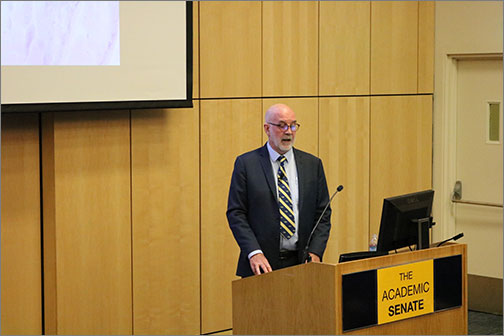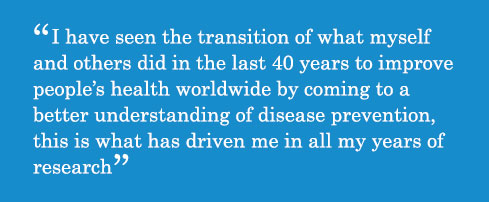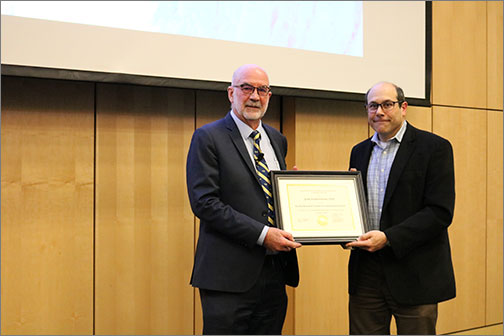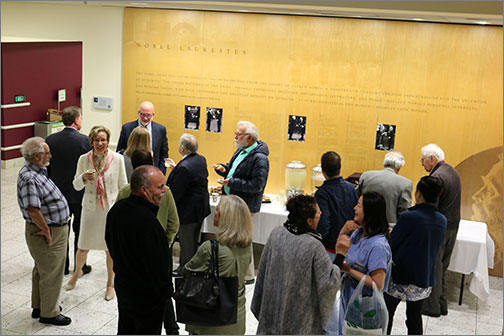Post-Event Summary 2017 Faculty Research Lecture in Translational Science: John Featherstone
January 10, 2018

Chemistry Becomes Patient Care
John Featherstone, MSc, PhD, was selected by his peers on the Academic Senate’s Committee on Research (COR) as the eighth annual Faculty Research Lectureship (FRL) in Translational Science.
The FRL event took place Thursday, Dec. 7, 2017 in Cole Hall on the Parnassus campus. It was live simulcast and is available for viewing for one year.
Dr. Featherstone, School of Dentistry (SOD) Dean and Professor of Preventative and Restorative Dental Sciences, retired from his positions at the end of December 2017, but will continue researching voluntarily and participate in cariology-related organizations.
Featherstone’s lecture was titled, “Chemistry Becomes Patient Care.” His presentation highlighted how his research has helped to develop new methods for managing and restoring tooth decay through validated risk assessment procedures, and the new dental laser technology.
The FRL series began in 1957 with a basic science award and in the following years grew to include clinical and translational science awards. Translational science focuses on faculty who translate scientific research into clinical practice. The FRL awards are given to three separate, distinguished faculty members each year. After UCSF faculty submit nominations, the Senate’s COR makes the final decisions.
“I was amazed and thrilled to be chosen as the next FRL speaker,” Featherstone said. “It is a great honor to be chosen for this in the UCSF environment, because we have some of the best scientists in the world.”
Featherstone’s research career of four decades specialized in tooth decay (dental caries) studies otherwise known as cariology. Some of the specific cariology studies have included: fluoride mechanisms of action, teeth demineralization and remineralization, apatite chemistry, salivary dysfunction, caries risk assessment, and laser interactions with teeth and bones.
He got involved in tooth decay research after receiving his bachelor’s degree and spending a few years working in the cosmetic and pharmaceutical industries. Then, he decided to further his education and obtained his master’s degree and after that, his PhD degree.
“After I completed my MSc, I contacted my former undergraduate professor and he recommended I pursue research in the chemistry of tooth decay, and here I am 45 years later still in that line of research,” Featherstone said.
His studies have led to groundbreaking research on laser interactions with hard tissues and Caries Management by Risk Assessment (CAMBRA), which is a dentistry practice that Featherstone and his team developed to advocate for disease prevention rather than surgery. CAMBRA is now taught at academic dental clinics throughout the U.S. and Featherstone has presented on CAMBRA implementation internationally as well.
 “I have seen the transition of what myself and others did in the last 40 years to improve people’s health worldwide by coming to a better understanding of disease prevention,” Featherstone said. “This is what has driven me in all my years of research.”
“I have seen the transition of what myself and others did in the last 40 years to improve people’s health worldwide by coming to a better understanding of disease prevention,” Featherstone said. “This is what has driven me in all my years of research.”
When Featherstone first began his career as a basic physical scientist, he said gaining access to knowledge was vastly different from now. In fact, he said in his early research career years they didn’t even have “good copying machines.”
Featherstone would spend hours in the library reading reference books and scientific journals, rather than the modern day electronic abstracts.
“With the creation of computers and the internet, information is now more readily available for researchers,” Featherstone said.
He also said that in the beginning years of his career, he noticed that scientists were intentional with forming personal interactions with other scientists by studying one another’s work and traveling to global scientific meetings to meet up. He urges scientists to continue this trend in the present day.
“If you look at the history of famous scientists, they had tremendous personal interactions with others, and in the world of science this is crucial for competition, sharing, and taking steps forward in research,” Featherstone said.

in Translational Science recipient from Stuart Gansky, MS, DrPH,
Chair of Committee on Research
Featherstone, a New Zealand native, began his journey to becoming a scientist when he attended Victoria University of Wellington, receiving a bachelor’s degree in chemistry and mathematics in 1964. Then, Featherstone went to England to pursue an MSc degree in physical chemistry from the University of Manchester, graduating in 1975. Following that, he returned to Victoria University of Wellington to obtain his PhD degree in chemistry in 1977.
After his educational training, Featherstone became a part of the University of Rochester’s Eastman Dental Center, becoming a professor and chair of oral sciences during his time there. Featherstone worked there from 1980-1995, and then left to join UCSF as a faculty member.
“I was recruited by UCSF and I knew it was a great opportunity, because I was coming to a top of the line research, clinical, and teaching university,” Featherstone said.
While at UCSF, Featherstone has served the SOD as an interim chair and chair of the department of Preventive and Restorative Dental Sciences from 1996-2005, before becoming the SOD interim dean in 2007 and dean in 2008.
Featherstone said UCSF’s atmosphere of collegiality, cooperation, collaboration, openness, and the Bay Area’s large number of scientific experts have contributed to him staying at the University for so long.
Outside of research and serving in dean roles, Featherstone has participated on the UCSF Academic Senate. He said that one of the biggest differences between working in the Northeastern U.S. and California is the emphasis that University of California places on shared governance.
“When I was a department chair in Rochester, things ran in a different fashion,” Featherstone said. I was fascinated when I came to UCSF and served on the Academic Senate within weeks of being here. I found that through shared governance we were making a difference by providing input to the administration.”
During his time at UCSF, Featherstone served as a Member on the Executive Council; as Member, Vice Chair, and Chair at the systemwide level for the University Committee on Research Policy (UCORP); and is currently an Ex Officio member on the SOD Faculty Council.

His experience as Chair of UCORP allowed him to visit every UC campus and shadow the UCOP Vice President of Research.
“I think the Academic Senate is one of the reasons why UCSF has such a high standard of excellence,” Featherstone said. “I think it behooves all faculty to contribute at some level. There are opportunities for both full-time and part-time faculty.”
Outside of the Senate, Featherstone served on a management committee through the University of California, which had a management contract to oversee Three national laboratories: Lawrence Berkeley National Laboratory (LBNL), Lawrence Livermore National Laboratory (LLNL), and Los Alamos National Laboratory (LANL).
Featherstone, who has now retired from his position as a full-time faculty member, is looking forward to spending his time in retirement to do the things that he has neglected during his role as dean.
“I plan to spend more time with my family and grandchildren,” Featherstone said. “I also want to invest time in my hobbies of: playing piano, exploring the outdoors, traveling to archeological sites, and sharpening up my language skills.”
Created by UC Board of Regents Standing Order 105, the UC San Francisco (UCSF) Academic Senate is empowered to exercise direct control over such academic matters as admissions for degrees and curricula, which are of central importance to the University. The UCSF Division of Academic Senate provides an independent forum to discuss faculty-related campus wide academic concerns. In other areas, the Senate exercises an active advisory role. The Academic Senate works within the larger body of UCSF, a leading university dedicated to promoting health worldwide through advanced biomedical research, graduate-level education in the life sciences and health professions, and excellence in patient care.
